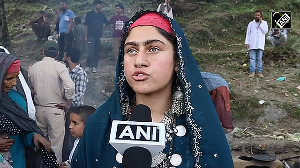India has conveyed to American businessmen that the approval of the landmark Indo-US nuclear accord will open new opportunities for them and contribute to energy security besides reducing global warming.
"The ratification of the agreement by the US Congress will strengthen Indo-US ties and open new economic opportunities for US companies in India and contribute to energy security," Parliamentary Affairs minister Vayalar Ravi said in Washington.
The Parliamentary Affairs minister, who is heading a high-level delegation on a visit to Washington, said that India would maintain a moratorium on testing and added the accord would also help India to combat climate change and strengthen global non-proliferation.
The delegation, which is visiting US after a gap of five years has members drawn from both the Lok Sabha and the Rajya Sabha with representation from all over the country. It also includes two ministers of state Pawan Bansal and Suryakant Patil.
Addressing a luncheon meeting organised by the United States-India Business Council on Tuesday, Ravi pointed out India's impeccable record on non-proliferation.
He said that New Delhi appreciated US leadership for creating conditions for it to resume international nuclear commerce and added that the ratification by the Congress of the 123 accord would strengthen Indo-US ties.
He told the US businessmen that the path of economic reforms in India is irreversible as there was a strong democratic consensus for this policy.
The minister said that efforts were being made to stimulate both domestic and foreign investments. "We shall do this by striking a right balance between risks and returns."
Elaborating on testing, the minister said India's vision was of a world free of nuclear weapons as Late Rajiv Gandhi put before the UN in 1988.
"This still has universal resonance. We maintain a universal moratorium on testing. We are working with others toward the conclusion of a universal, non-discriminatory and verifiable Fissile Materials Cut-off Treaty," Ravi said.
The Parliamentary Affairs minister said that India's own future is more closely linked with rest of the world.
The instability in our immediate neighbourhood, a conflict in the Middle East, a financial crisis in New York, the outcome of trade negotiations in Geneva, or a crop failure in East Asia have an immediate effect on India, he said.
"It is no longer merely the concern of businesses in Mumbai but also the compulsions of farms in Uttar Pradesh" the Indian minister who also holds the portfolio of Overseas Indian Affairs said.
Ravi pointed out that the importance of nuclear energy has been underscored by the steep increase in oil prices and future uncertainty that exists in this market.
"We have to work together to create conditions for secure, stable and reliable supplies and also to diversify our energy resources. This should also include renewable and clean energy and energy efficiency. Success in this effort will also have positive impact on the problem of global warming," he added.
Ambassador of India to the United States, Ronen Sen said that the bilateral relations had gone full circle, from close to feeling a sense of betrayal in the aftermath of the Tarapur experience to a radical, bold and a fundamental change.
"We have a great tradition of relations.. which is not inter-governmental" Sen said, adding, the US-India relations is the "most broad based relations we have".
The USIBC meeting was also addressed by Ashley Tellis, a senior fellow at the Carnegie Endowment for International Peace and at one time advisor to former Under Secretary of State for Political Affairs Nicholas Burns during negotiations with the Indian Government on the 123 Agreement.
"We are at the end of the road but not there yet," Tellis said stressing that the two countries have put in place a "new world" of relations by finally exorcising the ghosts of the past.
"We have a right to be hopeful..we have a right to be optimistic" Tellis remarked.
Asked about the problem that the Tatas were having in Singur in West Bengal and abouth the kind of message this could be sending to the American investors wanting to do business there, Ravi replied that the goings on in Singur did not point to a "pattern" in India.
"There are government of India guidelines and States are competing," the Indian Minister said while expressing hope that the issue in West Bengal would be sorted out.





